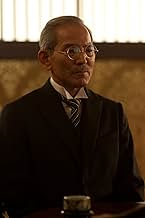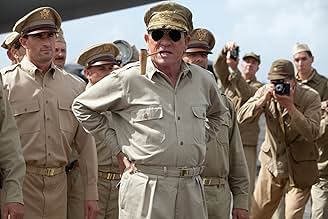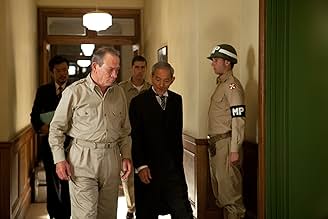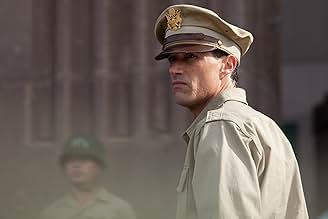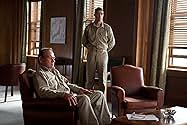AVALIAÇÃO DA IMDb
6,5/10
15 mil
SUA AVALIAÇÃO
Durante a ocupação do Japão após a Segunda Guerra Mundial, o comando das Forças Aliadas decide o destino do líder japonês e do próprio país.Durante a ocupação do Japão após a Segunda Guerra Mundial, o comando das Forças Aliadas decide o destino do líder japonês e do próprio país.Durante a ocupação do Japão após a Segunda Guerra Mundial, o comando das Forças Aliadas decide o destino do líder japonês e do próprio país.
- Direção
- Roteiristas
- Artistas
- Prêmios
- 1 indicação no total
- Direção
- Roteiristas
- Elenco e equipe completos
- Produção, bilheteria e muito mais no IMDbPro
Avaliações em destaque
Emperor (2012)
In his rule over Japan as Supreme Commander of the occupying forces after World War II, General Douglas MacArthur was probably as benign a dictator as history has recorded. His enlightened policies led to a Japanese post war economic recovery from wartime devastation, and to post-war harmony between Japan and the West that replaced virulent wartime hatred. Emperor deals with his first days in Japan after the Japanese surrender, and in particular, with his momentous decision not to include the Emperor Hirohito among the Japanese war criminals, a judgement made despite political and popular clamor. Allied war propaganda had demonized the Japanese people and Hirohito in particular, and Japanese propaganda had done much the same with the other side. MacArthur's decision became the lynch-pin of his policy there: to respect the cultural differences instead of seeking to override them, and to try to bring together the best that both Japan and the western powers had to offer.
The movie deliberately avoids clarifying which emperor the title refers to. On the surface it may seem to denote Hirohito, but as supreme commander MacArthur had near imperial power, and did not hesitate to use it. The film concentrates on one of his protégés and close advisors, General Bonner Fellers, a Japanese expert on whose opinion MacArthur chooses to rely. Fellers was close to MacArthur, having served with him even before the war. Fellers loved Japan and had visited it, and had produced for the American military a crucial assessment of the Japanese military mind. He had additionally predicted war with Japan well in advance of Pearl Harbour. In real life, Fellers had some connections to Japan, even to the Imperial Household, and he had a close friendship with a former female Japanese exchange student whom he knew from Earlham College in Indiana. He rejoined MacArthur in 1943 and accompanied him during the Supreme Commander's momentous first days in Japan. The film strongly hints that MacArthur had already made up his mind about the treatment of Hirohito, which he almost certainly had, but wanted Fellers to supply the rationale for his decision.
The film has three threads that run throughout: MacArthur's occupation of Japan; Fellers' investigations leading to his written opinion; Fellers' search for his Japanese friend amidst the post-war chaos. It is one thread too many, since while the film juxtaposes these, it does not successfully weave them together. The one exception may be Fellers interview with the Japanese general, supposedly his friend's uncle, since it does much to explain the country's traditions and military attitudes. Director Peter Webber has said quite rightly that MacArthur has not been particularly successfully treated on the screen. In fact, epics like MacArthur (1977) and Inchon (1981) proved to be major disappointments. It seems a shame here that the director and writers Vera Blasi and David Klass did not keep MacArthur as the film's central figure, but instead chose to focus on his subordinate, Fellers.
As MacArthur, Tommy Lee Jones gives an outstanding performance, and the film is worth seeing for that alone. Looking nothing like MacArthur (he didn't try), Jones captures ever bit of "El Supremo's" command and self-confidence, and when he is present on screen, like the General himself, he dominates it. It is just a shame that he doesn't get more screen time. MacArthur is, historically, the man who made the real decisions, and, especially as played by Jones, a figure far more fascinating than Fellers.
By contrast, the part of Fellers (Matthew Fox of "Lost") seems dull, unfocused, and even clumsy, particularly considering the crucial days in which it is set. That is probably not Fox's fault, but a weakness of the screenplay. While the fact that Fellers knew Japan well and was especially friendly with a Japanese girl he had met in college are factors that deserve to enter into the picture, as presented they often tend to be a distraction from its central theme. This is all the more the case since the story of "Aya" appears to contain considerable fiction. Feller's real-life friend from Earlham, Yuri Wantanabe, survived the war, and his connections to Japanese officialdom were probably better than her own. There is the additional fiction that all this is compressed into a ten-day window, when the actual investigations took place over five months.
Still, in playing Aya, Eriko Hatsune renders her subtly, displaying a delicate balance between propriety and concern. Some of the other Japanese actors are equally notable. Especially fine, and especially central to the story, is the portrayal by Masatô Ibu of the Lord Privy Seal, Marquis Koichi Kibo, the highest figure in the Imperial Household and a friend to Hirohito. Ibu is persuasive in presenting a man who attempts to preserve the Emperor's honour – and his privacy – even in the face of the possibility that the Emperor might hang. Masayoshi Haneda also gives a fine performance as Fellers' interpreter and de facto aide. And Takatarô Kataoka is realistic as Emperor Hirohito himself.
The wanderings of the plot are offset in part by the great production values (Grant Major)and fine cinematography (by Stuart Dryburgh). The contrast between the real beauty of Japan and the wartime devastation is particularly effective.
This movie has many good things going for it, particularly Tommy Lee Jones (and MacArthur himself). It's just a pity it didn't capitalize on them more.
Emperor premiered at the Toronto International Film Festival on September 14, 2012. It has been acquired for distribution by Lionsgate & Roadside Attractions, but no date for general distribution has yet been announced.
In his rule over Japan as Supreme Commander of the occupying forces after World War II, General Douglas MacArthur was probably as benign a dictator as history has recorded. His enlightened policies led to a Japanese post war economic recovery from wartime devastation, and to post-war harmony between Japan and the West that replaced virulent wartime hatred. Emperor deals with his first days in Japan after the Japanese surrender, and in particular, with his momentous decision not to include the Emperor Hirohito among the Japanese war criminals, a judgement made despite political and popular clamor. Allied war propaganda had demonized the Japanese people and Hirohito in particular, and Japanese propaganda had done much the same with the other side. MacArthur's decision became the lynch-pin of his policy there: to respect the cultural differences instead of seeking to override them, and to try to bring together the best that both Japan and the western powers had to offer.
The movie deliberately avoids clarifying which emperor the title refers to. On the surface it may seem to denote Hirohito, but as supreme commander MacArthur had near imperial power, and did not hesitate to use it. The film concentrates on one of his protégés and close advisors, General Bonner Fellers, a Japanese expert on whose opinion MacArthur chooses to rely. Fellers was close to MacArthur, having served with him even before the war. Fellers loved Japan and had visited it, and had produced for the American military a crucial assessment of the Japanese military mind. He had additionally predicted war with Japan well in advance of Pearl Harbour. In real life, Fellers had some connections to Japan, even to the Imperial Household, and he had a close friendship with a former female Japanese exchange student whom he knew from Earlham College in Indiana. He rejoined MacArthur in 1943 and accompanied him during the Supreme Commander's momentous first days in Japan. The film strongly hints that MacArthur had already made up his mind about the treatment of Hirohito, which he almost certainly had, but wanted Fellers to supply the rationale for his decision.
The film has three threads that run throughout: MacArthur's occupation of Japan; Fellers' investigations leading to his written opinion; Fellers' search for his Japanese friend amidst the post-war chaos. It is one thread too many, since while the film juxtaposes these, it does not successfully weave them together. The one exception may be Fellers interview with the Japanese general, supposedly his friend's uncle, since it does much to explain the country's traditions and military attitudes. Director Peter Webber has said quite rightly that MacArthur has not been particularly successfully treated on the screen. In fact, epics like MacArthur (1977) and Inchon (1981) proved to be major disappointments. It seems a shame here that the director and writers Vera Blasi and David Klass did not keep MacArthur as the film's central figure, but instead chose to focus on his subordinate, Fellers.
As MacArthur, Tommy Lee Jones gives an outstanding performance, and the film is worth seeing for that alone. Looking nothing like MacArthur (he didn't try), Jones captures ever bit of "El Supremo's" command and self-confidence, and when he is present on screen, like the General himself, he dominates it. It is just a shame that he doesn't get more screen time. MacArthur is, historically, the man who made the real decisions, and, especially as played by Jones, a figure far more fascinating than Fellers.
By contrast, the part of Fellers (Matthew Fox of "Lost") seems dull, unfocused, and even clumsy, particularly considering the crucial days in which it is set. That is probably not Fox's fault, but a weakness of the screenplay. While the fact that Fellers knew Japan well and was especially friendly with a Japanese girl he had met in college are factors that deserve to enter into the picture, as presented they often tend to be a distraction from its central theme. This is all the more the case since the story of "Aya" appears to contain considerable fiction. Feller's real-life friend from Earlham, Yuri Wantanabe, survived the war, and his connections to Japanese officialdom were probably better than her own. There is the additional fiction that all this is compressed into a ten-day window, when the actual investigations took place over five months.
Still, in playing Aya, Eriko Hatsune renders her subtly, displaying a delicate balance between propriety and concern. Some of the other Japanese actors are equally notable. Especially fine, and especially central to the story, is the portrayal by Masatô Ibu of the Lord Privy Seal, Marquis Koichi Kibo, the highest figure in the Imperial Household and a friend to Hirohito. Ibu is persuasive in presenting a man who attempts to preserve the Emperor's honour – and his privacy – even in the face of the possibility that the Emperor might hang. Masayoshi Haneda also gives a fine performance as Fellers' interpreter and de facto aide. And Takatarô Kataoka is realistic as Emperor Hirohito himself.
The wanderings of the plot are offset in part by the great production values (Grant Major)and fine cinematography (by Stuart Dryburgh). The contrast between the real beauty of Japan and the wartime devastation is particularly effective.
This movie has many good things going for it, particularly Tommy Lee Jones (and MacArthur himself). It's just a pity it didn't capitalize on them more.
Emperor premiered at the Toronto International Film Festival on September 14, 2012. It has been acquired for distribution by Lionsgate & Roadside Attractions, but no date for general distribution has yet been announced.
I had to view "Emperor" twice before rendering a judgment. The first time went by. Not so much in any way, but something lingered. In the meantime, I visited Japan and read the Pulitzer prize-winning book by Herbert Bix: Hirohito and The Making of Modern Japan. The second viewing was thus clearly different. This film is much like a chapter torn out of the entire book. No wonder some viewers find the film "dry", "textbook-like", or with some other unsatisfactory notes. I believe I can tell why. While the book lays an excellent ground on why we should care about this man-god called and believed by most Japanese as "Emperor, Son of The Sun", if we want to understand this part of human history, the film chooses to disregard the background and assume that the viewers are already interested. This well-made film fails at making us care enough, except the ones already do. I am one of the ones who do care. The film delicately tells a story of a great nation forced on its knees. A pain of a 2,000-year-old nation being dominated by a very young superpower with no real culture of its own. A tough choice between sacrificing oneself or the Emperor they claim to be so devoted to with their lives. However, the heart of this film is also quite well-portrayed. It is that a sheer power is always submissive to a great culture. The American leadership chose not to destroy Japan not only because it was strategically wrong, but also because the culture of Japan was and is one of the triumphs of all mankind. Destroying such a human creation is to destroy a portion of oneself. Emperors have power not only to destroy but also to protect, that is.
In the fine biographical movie MacArthur which starred Gregory Peck as the controversial general only a small part was devoted to the years as Supreme Commander Allied Powers in charge of the occupation of Japan. Even liberal historians give Douglas MacArthur credit for the vast and peaceful societal change that our occupation of Japan post World War II wrought. We haven't been that successful since. And only a part of that part of the movie concerned the decision about the Emperor's fate.
Emperor concerns those fateful first days of the occupation when MacArthur made the decision not to try the Emperor or members of the royal family as war criminals. Doing the investigation on MacArthur's behalf was General Bonner Fellers who was an army intelligence officer with a background in Japanese language and culture. Matthew Fox is General Fellers and he's got another mission for himself, to find an exchange student from Japan from his youth and whom he knew up to the declaration of war between the USA and Japan.
Tommy Lee Jones plays MacArthur and while he doesn't have that majestic cultured voice that MacArthur had, he still creates a good impression of the imperious general who had a dislike of civil authority. In fact traces of the behavior that got him sacked by Harry Truman during the Korean War are shown. In this case though MacArthur with help of Fellers and his own knowledge of the Asian scene had the right instincts.
The Emperor of Japan centuries ago was a true ruler and over the centuries evolved into a constitutional monarch. But not the same as that Windsor family that reigns in the United Kingdom. The Japanese Shinto religion conferred divine status, the original emperor one Jimmu Tenno is supposed to be descended from the sun god. Japan's wars and foreign policy were done in his name, still are to some extent. A greater decision from Hirohito's part came when he said that he and his family were not divine.
Not covered in this film was the fact that Hirohito had some brothers, at least one of them would have been a more than willing tool of the army and navy chiefs who conducted Japan's war. He faced until the surrender the distinct possibility of being overthrown himself by one of his siblings.
Matthew Fox and Tommy Lee Jones and the Japanese cast are perfectly cast in their roles and I recommend this film as good entertainment and for those with an interest in the Far East.
Emperor concerns those fateful first days of the occupation when MacArthur made the decision not to try the Emperor or members of the royal family as war criminals. Doing the investigation on MacArthur's behalf was General Bonner Fellers who was an army intelligence officer with a background in Japanese language and culture. Matthew Fox is General Fellers and he's got another mission for himself, to find an exchange student from Japan from his youth and whom he knew up to the declaration of war between the USA and Japan.
Tommy Lee Jones plays MacArthur and while he doesn't have that majestic cultured voice that MacArthur had, he still creates a good impression of the imperious general who had a dislike of civil authority. In fact traces of the behavior that got him sacked by Harry Truman during the Korean War are shown. In this case though MacArthur with help of Fellers and his own knowledge of the Asian scene had the right instincts.
The Emperor of Japan centuries ago was a true ruler and over the centuries evolved into a constitutional monarch. But not the same as that Windsor family that reigns in the United Kingdom. The Japanese Shinto religion conferred divine status, the original emperor one Jimmu Tenno is supposed to be descended from the sun god. Japan's wars and foreign policy were done in his name, still are to some extent. A greater decision from Hirohito's part came when he said that he and his family were not divine.
Not covered in this film was the fact that Hirohito had some brothers, at least one of them would have been a more than willing tool of the army and navy chiefs who conducted Japan's war. He faced until the surrender the distinct possibility of being overthrown himself by one of his siblings.
Matthew Fox and Tommy Lee Jones and the Japanese cast are perfectly cast in their roles and I recommend this film as good entertainment and for those with an interest in the Far East.
This film tells a fascinating story in fine style, but it is difficult to see how anyone thought it was big screen material. Its box office takings were predictably low and it was in theatres so briefly that I had to catch it on DVD which was certainly a worthwhile endeavour.
In 1945, General Douglas MacArthur was made Supreme Commander in American- occupied Japan and one of his first and most momentous decisions was whether or not to execute Emperor Hirohito as a war criminal. For most Americans, there was no debate: Hirohito was the man who endorsed the infamous attack on Pearl Harbor. But, whether or not he backed the war, a case could be made that he was crucially instrumental in bringing about the peace by ordering the Japanese to surrender. Furthermore the hanging of the emperor - still revered by most Japanese as a deity - could well lead to an explosion of violence that would make the occupation by the Americans and the revival of the shattered nation immensely more difficult.
MacArthur commissioned Brigadier General Bonner Fellers to make a study of the emperor's complicity and make a recommendation on execution. Fellers was someone who knew the Japanese well and had considerable respect for their ancient culture. Indeed, before the war, he had fallen in love with a Japanese woman studying in the United States and, even after the war, was anxious to see her again.
This amazing story is told respectfully by British director Peter Webber and writers Brazilian Vera Blasi and American David Klass, drawing on Shiro Okamoto's book "His Majesty's Salvation", in a film that even-handedly represents Japanese perspectives of the time. The acting is first-rate with Matthew Fox (best-known for the TV series "Lost") giving a sensitive performance as Fellers and Tommy Lee Jones perfectly cast as the swaggering MacArthur. Many excellent Japanese actors contribute, notably the lovely Eriko Hatsune as Fellers' girlfriend. Shot on locations in both New Zealand and Japan, high production values make this an admirable viewing experience.
The movie lacks the fast-paced action that many expect from a visit to the cinema and arguably it is overly sympathetic to the Japanese position and somewhat saccharine in its treatment of the romance, but it is a real pleasure to see a work that tells a little- known story of such consequence so well.
In 1945, General Douglas MacArthur was made Supreme Commander in American- occupied Japan and one of his first and most momentous decisions was whether or not to execute Emperor Hirohito as a war criminal. For most Americans, there was no debate: Hirohito was the man who endorsed the infamous attack on Pearl Harbor. But, whether or not he backed the war, a case could be made that he was crucially instrumental in bringing about the peace by ordering the Japanese to surrender. Furthermore the hanging of the emperor - still revered by most Japanese as a deity - could well lead to an explosion of violence that would make the occupation by the Americans and the revival of the shattered nation immensely more difficult.
MacArthur commissioned Brigadier General Bonner Fellers to make a study of the emperor's complicity and make a recommendation on execution. Fellers was someone who knew the Japanese well and had considerable respect for their ancient culture. Indeed, before the war, he had fallen in love with a Japanese woman studying in the United States and, even after the war, was anxious to see her again.
This amazing story is told respectfully by British director Peter Webber and writers Brazilian Vera Blasi and American David Klass, drawing on Shiro Okamoto's book "His Majesty's Salvation", in a film that even-handedly represents Japanese perspectives of the time. The acting is first-rate with Matthew Fox (best-known for the TV series "Lost") giving a sensitive performance as Fellers and Tommy Lee Jones perfectly cast as the swaggering MacArthur. Many excellent Japanese actors contribute, notably the lovely Eriko Hatsune as Fellers' girlfriend. Shot on locations in both New Zealand and Japan, high production values make this an admirable viewing experience.
The movie lacks the fast-paced action that many expect from a visit to the cinema and arguably it is overly sympathetic to the Japanese position and somewhat saccharine in its treatment of the romance, but it is a real pleasure to see a work that tells a little- known story of such consequence so well.
I have to admit I liked this movie a lot. The plot is straightforward: General Bonner Fellers (Matthew Fox) is hired by General Douglas MacArthur (Tommy Lee Jones) to investigate the role of Emperor Hirohito (Takataro Kataoka) during World War II, to investigate whether the Emperor should be tried as a war criminal. However the film is about a lot more than just conduct during war; it is a story of cultural adaptation, as Fellers comes to know something about Japanese attitudes towards the conflict, and how they differ significantly from those embraced by the Americans. Eventually the two sides come to an understanding - so much so that Hirohito actually deigns to have a meeting with MacArthur, something hitherto considered unthinkable in Japanese aristocratic culture. Jones' MacArthur is just wonderful - although physically very different from the actual person, the actor captures the mannerisms, the aggressiveness, and the softness lurking beneath an apparently gruff personality.
Você sabia?
- CuriosidadesThe romantic story between Fellers and Aya was entirely fictional for the film. Bonner F. Fellers was married in 1925 to Dorothy Dysart who accompanied him twice on his posting to the Phillipines, and she also went with him to China and Japan.
- Erros de gravaçãoIn the opening sequence the film makers use archival film showing an atom bomb being loaded into the bomb bay a B-29 for the attack on Hiroshima. The bomb shown is "Fat Man" and not "Little Boy" that was used on the attack on Hiroshima (8-6-1945). "Fat Man" was used in the second attack, three days later (8-9-1945) on Nagasaki.
- Citações
General Douglas MacArthur: I don't want the Communists in here. But Washington wants vengance on the emperor, because their voters do, and their voters have no fucking idea what's good for them.
Principais escolhas
Faça login para avaliar e ver a lista de recomendações personalizadas
- How long is Emperor?Fornecido pela Alexa
Detalhes
- Data de lançamento
- Países de origem
- Centrais de atendimento oficiais
- Idiomas
- Também conhecido como
- Emperor
- Locações de filme
- Empresas de produção
- Consulte mais créditos da empresa na IMDbPro
Bilheteria
- Faturamento bruto nos EUA e Canadá
- US$ 3.346.265
- Fim de semana de estreia nos EUA e Canadá
- US$ 1.014.099
- 10 de mar. de 2013
- Faturamento bruto mundial
- US$ 14.858.240
- Tempo de duração
- 1 h 47 min(107 min)
- Cor
- Mixagem de som
- Proporção
- 2.35 : 1
Contribua para esta página
Sugerir uma alteração ou adicionar conteúdo ausente








